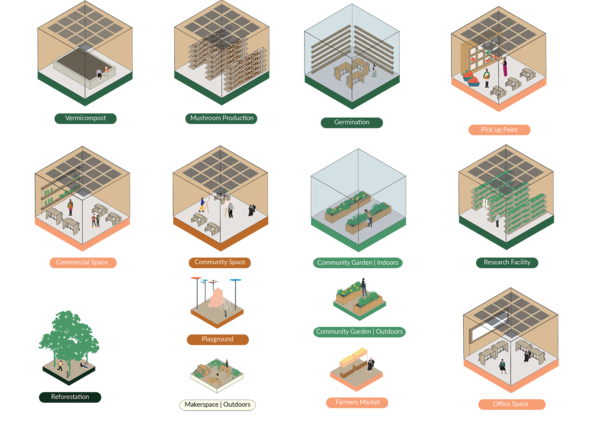TU Delft student team ‘Lettus Design’ has won the Urban Greenhouse Challenge
LettUs Design Team of TU Delft proposed a winning modular urban farming concept that can be tailored to the needs of a neighbourhood with poor access to healthy food, good education and the resulting lack of economic opportunities. The Ward 7 community is one of the most underprivileged sites in Washington DC facing economic problems and health problems due to poor access to healthy nutrition as the food availability within the ward is extremely restricted. With their design, the team won the first prize of the Urban Greenhouse Design Challenge.
The Urban Greenhouse Challenge
The Urban Greenhouse Challenge is an annual design competition of the Wageningen University that looks to use urban agriculture to remedy issues relating to food security, nutrition, economic prosperity, and improvements in health and wellbeing. Participants were invited to develop a concept that ensures year-round sustainable and affordable food production. This year’s Challenge was called the ‘social impact’ edition; more than in previous editions, students had to take into account the social aspects of the locality.
A modular approach
In their attempt to address the challenges of Ward 7, the LettUs Design Team proposes a modular urban agriculture concept that can be adapted to the needs of the community. A modular approach allows for local participation not only during the conceptualisation of the concept, but also during the development and adaptation to possible future scenarios. This is achieved through configurable modules for each aspect of the site: Food production, food processing, community involvement, social life and leisure, education, employment, etc.
Central to this is a symbiotic and reliable food production system where aquatic animals and aquatic plants are grown in a symbiotic manner. This system can be used all year round and can be adapted to the desired scale and different crops, including ethnic products. One of the key aspects of the proposal was the development of a game board that can be used to capture the ideas of the local residents. This game board includes a site map divided into a grid the size of the modules and then colour-coded blocks that are used to place the different modules across the site.
The jury
The international jury praised Lettus Design for proposing “by far the most inclusive proposal, from the outset.” “As the team indicated, it’s not just them who are the architects and experts, it’s also the community. They took on a replicable modular approach in terms of food production, employment and education. But what really drove it home was the idea that this process and approach could be replicable and customized to other communities.”
More information
Read more about the international jury and the challenge.
The TU Delft student team consisted of students from several faculties and studies like Architecture and the Built Environment, Civil Engineering, Electrical Engineering and Industrial Design Engineering. They were assisted by Andy Jenkins (BK TU Delft) and Eva Frese (IDE TU Delft and Agtech Institue) and Liselotte de Vries (of Agtech institute). The LettUs Design team exists of Sarah Hoogenboom, Adrianna Waleszczak, Eren gozde Anil, Prathamesh Patalay, Caroline Gasten, Isidora Matskidou, Jonathan Schieren, Oda Lægran, and Emma Little.
Find the information about the LettUs Design team.
More information about the Urban Greenhouse Challenge can be found here. The next year challenge will be organised about Nature Based Solutions.

